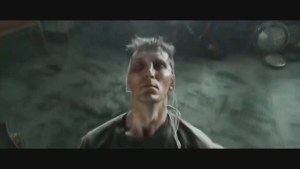Over two hundred years on, Mary Shelley’s Frankenstein remains a key horror/gothic text – both for its contribution to shaping horror as a genre evolving out of the gothic novel (arguably, the horror film as such wouldn’t have developed into a genre if it weren’t for James Whale’s Frankenstein in 1931) and for its array of eternally relevant themes and talking points (the responsibilities of parenthood, the dangers of science unchecked, the nature-nurture debate, romantic hubris, etc). Writer-director Larry Fessenden has always been drawn to the major arcana of the genre: his first feature, No Telling, is also known as The Frankenstein Complex, and he followed up with distinctive, personal spins on vampire (Habit) and werewolf (Wendigo) stories.
Here, returning to the auteur seat after a spell producing and appearing in many other peoples’ movies, Fessenden comes to grips with Frankenstein, engaging with the original text as Bernard Rose’s Frankenstein and Sam Ashurst’s Frankenstein’s Creature have in recent years. Like Rose, he resets the story in a modern setting – though more consciously embracing the cultural legacy of the novel and its adaptations. Characters have names knowingly taken from Shelley – though it’s ambiguous as to whether the mad scientist (David Call) is actually called Henry Frankenstein (‘not Victor, like in the movie’ – referring to the 1931 version) or is just being nicknamed that by his partner/enabler/sponsor/evil associate Dr Polidori (Joshua Leonard), himself named for Byron’s physician and a witness to the birth of Shelley’s novel or for the character James Mason plays in Frankenstein The True Story.
There’s a thread of the Hammer Films version of the story, in which brains wake up in new bodies and struggle to cope, sometimes bothering people from their old lives – The Revenge of Frankenstein, Frankenstein and the Monster From Hell. We even get a black and white Whale-look nightmare of the Monster crawling out of a grave during a thunderstorm and going on a Karloffian rampage – which turns out to be a version of what’s happening in the story rather than a fevered imagining on the part of the PTSD-afflicted, driven-to-the-end-of-his-tether Henry. This is a rare Frankenstein film to shift the onus of guilt away from medical science and onto the sort of people who fund Frankensteins, and plan on owning the lucrative applications of their work – Dr Polidori is literally a murdering capitalist, snatching bodies and brains off the streets of New York, and insists that the new-made Adam (Alex Breaux) be treated with drugs he is desperate to market.
The moment of rejection that’s the key to Shelley’s story is replaced with a gradual disillusion and distraction, and as in so many takes on this story long stretches of the monster learning to control his body, playing ping-pong, coming to appreciate music ad art, developing a personality, and coming into contact with other people than his maker encourage us to hope that this time the experiment will work, will turn out all right (it’s one reason Young Frankenstein is so loved – there, the doctor eventually does right by the monster). But look at the title, notice the strains between the characters, worry that Polidori is hurrying things along too fast (a trip to the Metropolitan Museum followed by a strip club), and realise that tragedy is inevitable – though there’s still suspense about how things will turn out for individual characters.
Like all of Fessenden’s films, it’s richly imagined and layered, demanding repeat viewings, with much material of his own stirred into that inherited from the source text – Henry names his creature Adam, like the Frankenstein analogue did on Dark Shadows, for obvious, Miltonic reasons, but later we learn there’s another, more contemporary spur to his choice. Breaux is a particularly strong Frankenstein Monster, sporting scars and braces, with a look evolving from a Hammer take (bald head, brain surgery sutures) to something closer to the Universal archetype (back from one of his graves in muddy Karloff clothes with foreshortened arms, he even walks and poses like the classic screen monster). Unfashionably, but in keeping with the very male tone of the novel, women are on the sidelines, kept out of the intricate struggles between creator and created, but Fessenden is incapable of writing a flat character and there are vivid little roles for Frankenstein’s girlfriend Liz (Ana Kayne), the girl the monster’s brain remembers (Chloe Levine), Polidori’s ruthless wife (Maria Dizza) and doomed but distinctive bar girl Shelley (Addison Timlin).
Here’s the Frightfest listing.


I thought this was the best movie of the festival. Modern but with a touch of Karloff. Suitable pathos and a snowy finale. Bravo Larry!
Posted by David Smith | August 28, 2019, 5:52 pm